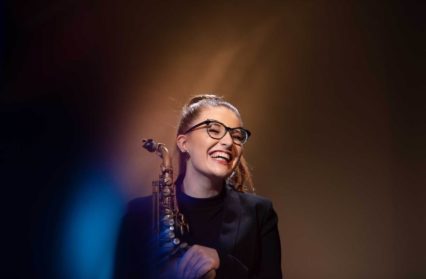Gary Raymond was at the St David’s Cathedral Festival to see saxophone virtuoso Jess Gillam raise the roof on Tuesday night with a dynamic and energetic programme of music.
In the last decade or so, my work has frequently afforded me the kind of privileges a boy of my background never had any right to expect. But few occasions will surely surprise me when looking back in my dotage as much as the one spent at St David’s Cathedral, a guest of the festival, sitting next to the Dean, front row, watching Cumbrian-born saxophone virtuoso and much-lauded ensemble leader Jess Gillam dazzle and charm a full house more used to perennial renditions of J.S. Bach with renditions as diverse as her take on Thom Yorke’s “Suspirium”. Gillam, of course, is no stranger to Bach either, and she brings out a spiky “Adagio ma non tanto” from the Sonata for Violin and Piano by the “lesser-known” C.P.E. And after that rowdy, rambunctious presentation, Dean Sarah Jones turns to me and whispers with a hint of approval, “now that is bonkers Bach”. Later on, Dean Sarah also whispers to me, “I haven’t heard the original, but that Björk music was very beautiful”. Indeed, Gillam and her trusty arranger John Metcalfe know how to unearth the aspects of “Venus as a Boy” that leaves the mercurial (although purposefully darting) percussion of the original song sprinkled in the air. I want to say to the Dean that she’d be better off keeping the wonder of Gillam’s version in her head, rather than seek out the original, but I think better of it: who am I to deny the world a possible new Björk fan?
Gillam, whose chirpy, carefree persona hides an intensity that only really becomes apparent when she’s performing, represents something of a shift for the St David’s Cathedral Festival. It’s forty-odd years old and started life dedicated entirely to the music of Bach. It attracts a dedicated following of traditionalists, and is a “worship-based” federation of donors and organisers and passions, something that is reflected in the audiences. There is a suggestion, albeit whispered (and I’m not quoting anyone here), that the future may lean more toward a diverse programming of classical and modern, perhaps even bringing in folk and other forms of traditional music. Gillam, who happily rests Bowie next to Shostakovich on her debut album RISE (2019), is not simply a bit of glamour, a sparkle of new wave in a programme of otherwise conservative greats, although she and her ensemble are young and filled with energy and the sort of respectful irreverence that can win over all sorts, even the hard-line naysayers. Her set this evening is so successful, is received with such enthusiasm, it would be easy to think that what she does is risk free, but it is actually the risk that elevates the music and the audience response. The musical surprises are as joyous as her energy is infectious. “Merry Christmas Mr Lawrence” is a piece that feels so familiar and yet there is something about it in these surroundings that also makes it somehow out of reach. And put it between a yearningly beautiful James Blake cover and a barnstorming medley of Piazolla tangos and it’s easy to feel like the roof might come off at any moment.
In the afternoon, before the concert, I have the honour of interview Gillam on stage to discuss her life and work so far. Even in the annals of the youthful prodigies of classical music, she must qualify as something of an over-achiever. Winner of Young Musician of the Year, an MBE, a number one debut album, the youngest ever presenter on BBC Radio 3 – these are just the banner headlines. As an interviewee, she’s one of those who makes my job easy. She is relaxed and open and her enthusiastic devotion to her chosen instrument is something that is particularly striking; but still, by the end, I feel there’s something I couldn’t get to the bottom of. What is it in any given piece of music that attracts her? For all of Gillam’s ability on the instrument – and she is everything you want in a soloist: bold, sensitive, aggressive, joyous, technically unimpeachable – her remarkable talent for picking music is perhaps overlooked. On her two studio albums, different genres do not sit awkwardly next to each other. She has found her voice, yes, but she Gillam also has the power to wrangle other people’s art into her own mode of expression. And what is it she expresses? Many things, but most potently it is the joy of music, the joy of performing, the connective power of letting rip in front of a live audience. The eclectic showstopper of John Harle’s “Flare” is as good a closer as you’re ever likely to experience.
That energy that Gillam extols has a legacy, and for an encore, her bubbling take on “Histoire de tango” is so infectious there’s no doubt had she carried that riff out the Cathedral door and up the hill into the woods, the congregation would have gladly followed her in procession perhaps never to be seen again. A thousand feet were tapping, strangers exchanged glowing smiles, and there’s every chance in years to come people will look back on the night the Jess Gillam Ensemble played St David’s as the night of a new dawn for the festival.
Jess Gillam’s latest album, TIME, is out now.



 Enjoyed this article? Support our writers directly by buying them a coffee and clicking this link.
Enjoyed this article? Support our writers directly by buying them a coffee and clicking this link.







